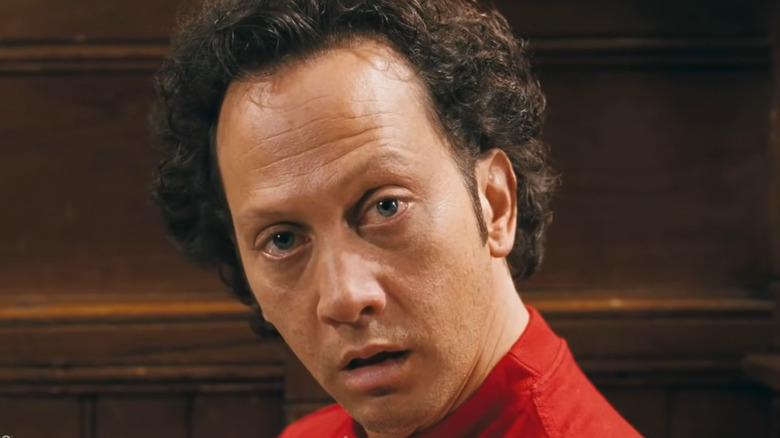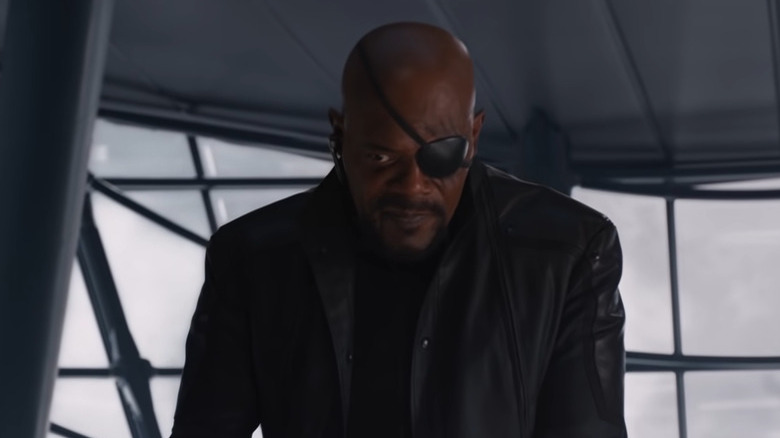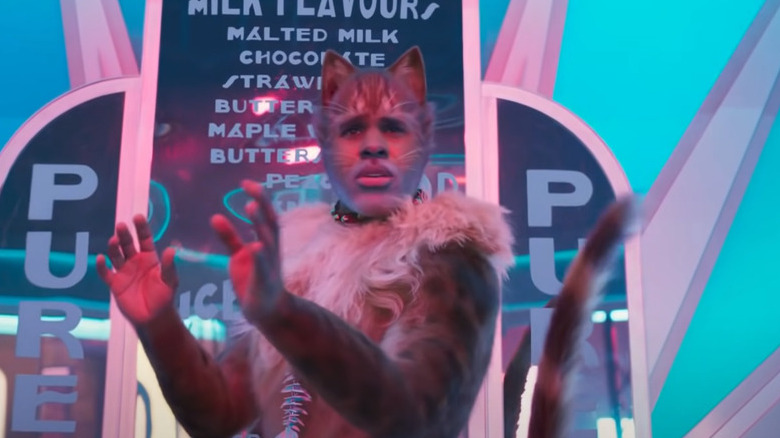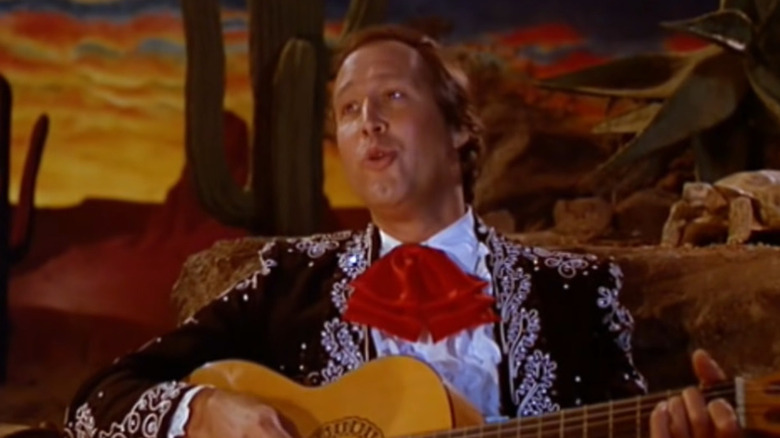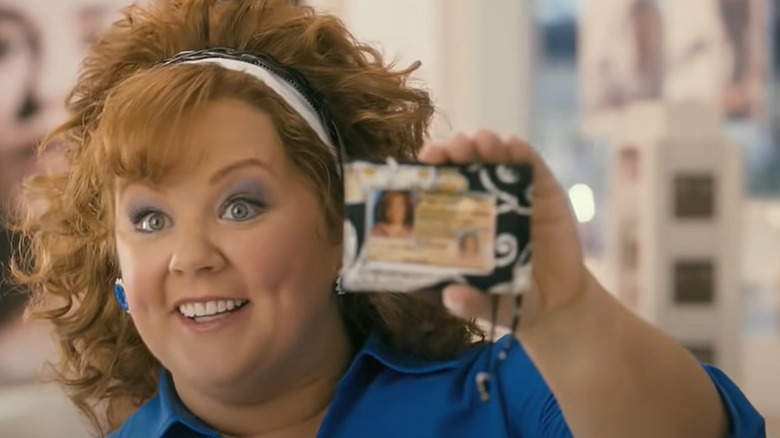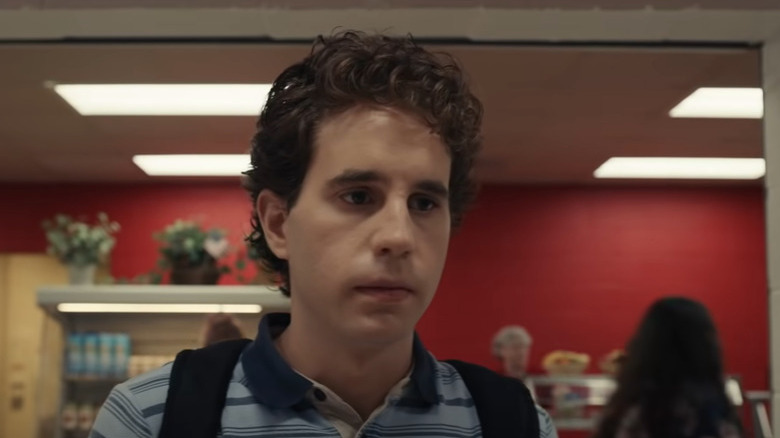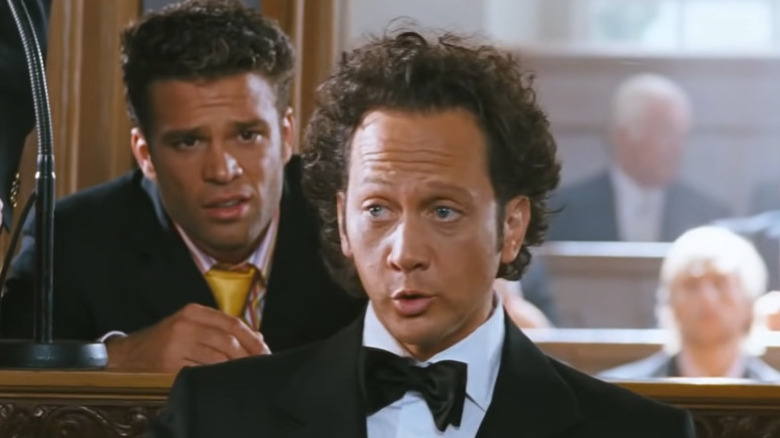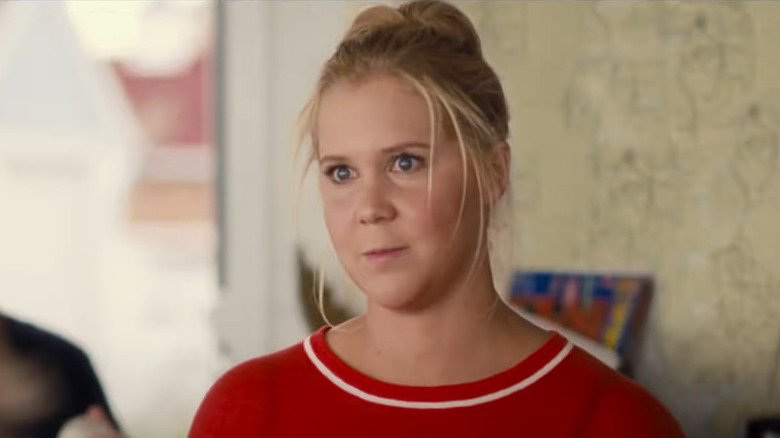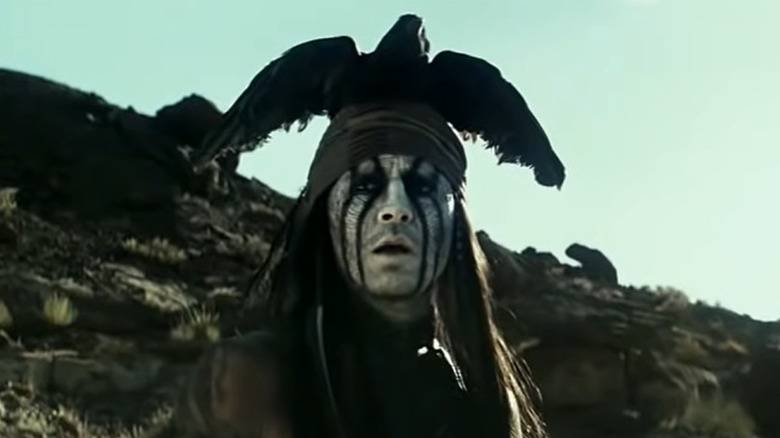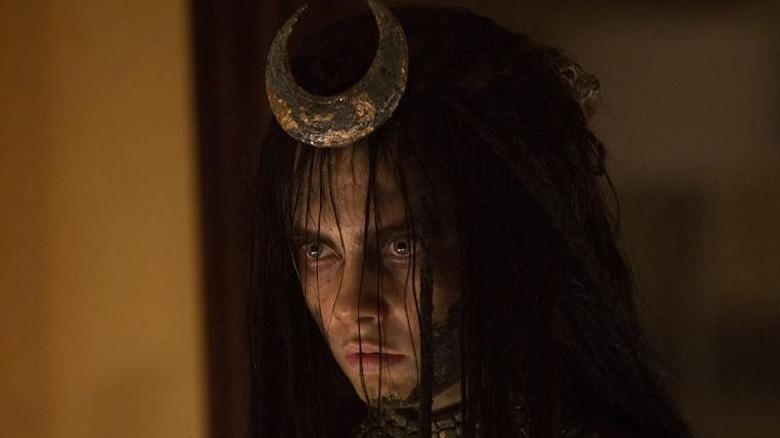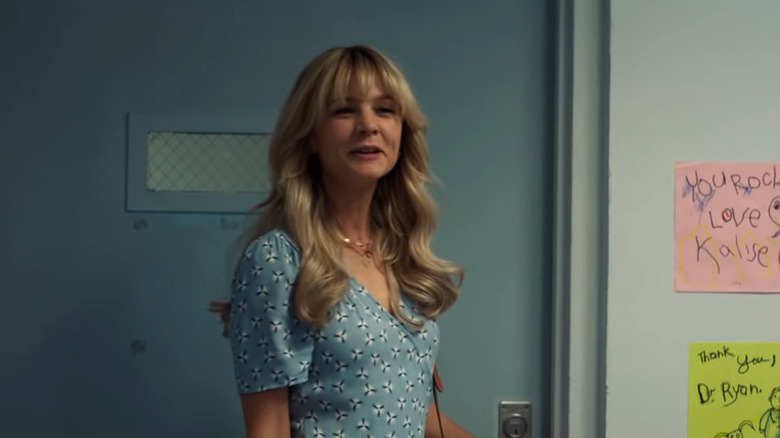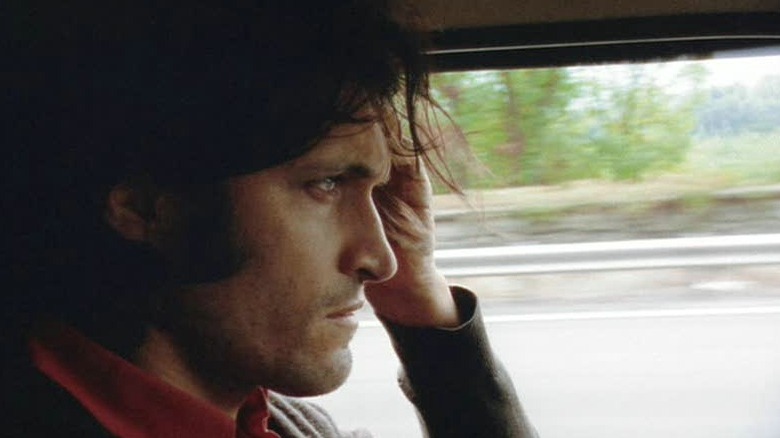Actors Who Ripped Into The Critics Who Didn't Like Their Movie
A lot of people will reduce film criticism down to simply saying whether or not you liked a movie, but that is selling critics short. True film criticism involves a conversation, where the critic responds to what they have seen and the points that it raised. However, every now and then, actors and directors have decided that they should join in on this conversation as well.
While many people believe that art should simply speak for itself, these actors disagreed, and they fired back, ripping into critics who didn't like their movies. In some cases, the critics had gone too far and deserved to be called out. Other times, the actors were just sour about a negative review. Regardless, the retorts are often amusing, as many film critics are quite good at snarky comebacks and put-downs. Let's take a look at some actors who ripped into the critics who didn't like their movie.
Samuel L. Jackson
Samuel L. Jackson is not a man who likes to make his points subtly. If you have upset Jackson, either in a film or in real life, he will let you know with some finely-worded profanity. Jackson has been in his fair share of hits and misses over the years, but the Marvel Cinematic Universe has gotten mostly positive reviews across the board from critics. However, he felt the need to call out one of the critics who was not a fan of 2012's "The Avengers."
New York Times film critic A.O. Scott admitted that while some of the humor worked, the film was full of "grinding, hectic emptiness" and "bloated cynicism." Jackson, who played Nick Fury in the film, took inspiration from his character's surname and tweeted "#Avengers fans,NY Times critic AO Scott needs a new job! Let's help him find one! One he can ACTUALLY do!" As chronicled by The Hollywood Reporter, many critics and Twitter users took Scott's side, as calling for a critic to be fired because he didn't like your movie isn't the best look, especially when your film has a Rotten Tomatoes score over 90%.
Jason Derulo
A few years ago, when people heard about the musical "Cats," they thought of the long-running Broadway show. The stage musical may not have been a critical darling, but it was charming in its own way. However, when people hear about "Cats" now, they immediately think of the absolute disaster that was the 2019 CGI adaptation. Despite its all-star cast and huge budget, the film was an infamous critical flop, with the hilariously negative reviews rolling in before it hit theaters. Variety's Peter Debruge called it "one of those once-in-a-blue-moon embarrassments," and the Los Angeles Times' Justin Chang said it was "as uneasy on the eyes as a Hollywood spectacle can be."
While most people were simply enjoying the ridiculous reviews, star Jason Derulo decided to weigh in (likely after singing his own name, of course). Derulo told TMZ that he was excited for "the people to actually see it, because reviewers, I mean, what the hell do they know?" In addition to suggesting that movie critics aren't human, Derulo promised that the film would be a "deportation to another dimension." While he probably meant that viewers would be "transported" to another dimension, it is pretty amusing that he chose a word that suggests people would only watch the movie by force.
Chevy Chase
Although the last few decades of his career suggest otherwise, there was a time when Chevy Chase was considered a marketable leading man. Movies like "Fletch" and "National Lampoon's Vacation" were critical and commercial successes, but the tides started to turn for the "SNL" alum in the late '80s. Even though "Three Amigos!" starred Chase alongside Steve Martin and Martin Short, it was not a big hit with critics at the time. In his memoir, Roger Ebert recalled a story where he talked negatively about the film (via EW).
Ebert and his TV reviewing partner Gene Siskel were on "The Tonight Show" alongside Chase, and Johnny Carson asked them what their least favorite release of the Christmas season was. Ebert, never afraid to be honest, said that it was "Three Amigos!," which led the famously sardonic Chase to quip, "Looking forward to your next picture." However, according to Ebert, Chase was in agreement with him, and he approached him after the show and admitted, "I didn't think it was so hot either."
Melissa McCarthy
Rex Reed of The New York Observer has been a film critic for quite some time, but he is probably best known for his rude and careless reviews in recent years. Take, for example, his original review of "The Shape of Water," (via IndieWire) where he claimed the director was Benicio Del Toro (it was Guillermo Del Toro) and that he was from Spain (neither Guillermo nor Benicio is). He also spent a good portion of his review of Edward Norton's 2019 film "Motherless Brooklyn" mocking Tourette's Syndrome, but perhaps his most famous incident was when he body shamed Melissa McCarthy in his review of "Identity Thief."
The majority of critics gave "Identity Thief" a negative review, but most of them criticized it for lacking any actual humor, instead of attacking McCarthy herself. Reed, however, made many disparaging remarks about the actress's weight throughout his review, calling her a "hippo" and "tractor sized." This quickly earned him the ire of even the film's harshest critics. McCarthy took some time to respond, but when she did, she took the high road, telling The New York Times, "I felt really bad for someone who is swimming in so much hate," adding that, "I just thought, that's someone who's in a really bad spot, and I am in such a happy spot." Seeing as how Reed continues to write spiteful reviews, he clearly remains in a really bad spot.
Ben Platt
Don't worry, "Cats" fans, because your favorite furry film isn't the only uncanny valley musical on this list. In 2021, Ben Platt starred in an adaptation of the Broadway musical "Dear Evan Hansen," playing the title role, which he had originated on stage. There was just one problem — Platt was too old to be playing a high schooler. It wasn't a problem when he was on stage, because you weren't seeing close-ups on his face, and it wouldn't have been a problem if they had gone the "Grease" route and filled the cast with people in their late 20s (and older), but they didn't, so Platt stuck out like a sore thumb. It wasn't the only issue critics had with the movie either, as Empire's Ian Freer called it "dramatically inert" and Deadline's Valerie Complex said it would inspire "disdain and indifference."
In an interview on "The Zach Sang Show," Platt defended his casting, saying "Were I not to do the movie, it probably wouldn't get made." He argued that people who were saying he was too old didn't know that he had "created the role and workshopped it for three years." Strangely enough, he followed his long defense of the casting by saying, "All I have to do is let the work speak for itself." When the work did finally speak for itself, it was met with a whopping 30% critics score on Rotten Tomatoes.
Ron Perlman
Adam McKay's epic comedy "Don't Look Up" seemingly starred every A-lister in Hollywood, including Leonardo DiCaprio, Jennifer Lawrence, Meryl Streep, Cate Blanchett, and many more, but the cavalcade of stars didn't mean universal acclaim. Critics and viewers alike were split down the middle, as some thought it was perfectly funny, while others thought its message was too on-the-nose or simply not handled well. However, mixed reviews weren't good enough for Ron Perlman, who played Colonel Benedict Drask in the film.
In a 2022 interview with The Independent, Perlman spoke out against anyone who didn't like the movie, saying, "F*** you and your self-importance and this self-perpetuating need to say everything bad about something just so that you can get some attention for something that you had no idea about creating." Perlman is just one of many actors who has said that critics need to be filmmakers themselves to say a film is bad, which is kind of like saying you need to be an architect to point out that a house is ugly.
Rob Schneider
If Rob Schneider spent time attacking every critic who gave him a negative review, he likely wouldn't have time for much else, but he decided to call out one who was not a fan of his sequel "Deuce Bigalow: European Gigolo." What Schneider was hoping would be "The Godfather: Part II" of male-sex-worker-themed comedy sequels turned out to be a critical disaster, and Schneider decided to challenge the credentials of one critic who knocked it. As recapped in Roger Ebert's review of the film, Los Angeles Times critic Patrick Goldstein said that Schneider should be nominated for the Oscar for "Best Running Penis Joke Delivered by a Third-Rate Comic."
Schneider, who was apparently in the mood to be mocked by critics again, decided to engage, and called Goldstein a "Third-Rate, Unfunny Pompous Reporter," mocking him for never winning a Pulitzer Prize. Enter Roger Ebert. Not only did Ebert defend Goldstein's credentials and mention various prizes he had won, but he laid things on the line as bluntly as possible to Schneider and said, "As chance would have it, I have won the Pulitzer Prize, and so I am qualified. Speaking in my official capacity as a Pulitzer Prize winner, Mr. Schneider, your movie sucks."
Amy Schumer
Making the initial switch from standup comedy to film isn't always easy, so comedians need a vehicle that capitalizes on their talent without just feeling like they're recycling material wholesale from their act. Amy Schumer managed to find just the right balance in the raunchy romantic comedy "Trainwreck." For the most part, critics were impressed, but Hollywood Elsewhere's Jeffrey Wells decided that he would make fun of Schumer's appearance in his review (which he wisely took down, but is documented in this Nylon article). Wells said of her, "There's no way she'd be an object of heated romantic interest in the real world," and compared her to "a blonde Lou Costello."
Thankfully, Wells did offer up an apology once his trainwreck review of "Trainwreck" was criticized, but that wasn't the end of it. At a Hollywood Reporter roundtable, Schumer said that only one critic criticized her appearance in their review of "Trainwreck," but "people really attacked him, and then he redacted that and wanted to date me." She never called out Wells by name, but it's quite clear who she was talking about. We feel like it's safe to assume that he never went out with her and ended up being embarrassed twice over.
Johnny Depp
The 2013 film "The Lone Ranger" was controversial before it was released, as it infamously went over budget, and even more infamously starred Johnny Depp as the Comanche sidekick Tonto. In an interview with Postmedia News, Depp defended his casting by saying, "I was told I was Cherokee as a kid. I was told I was Creek as a kid and Chickasaw. I've always had a fascination and a connection, so this film's a great opportunity to chip away a little bit at the [Tonto] cliché." However, it didn't do much to sway the critics, and Ryan Syrek of The Reader even began his review by telling the Washington NFL team, "For one glorious weekend in the summer of 2013, your unapologetically racist franchise is not the most grotesque pop culture representation of Native Americans!"
Depp, however, was not having it, telling The Guardian, "I think the reviews were written seven to eight months before we released the film," and adding that critics "had expectations that it must be a blockbuster." Producer Jerry Bruckheimer and star Armie Hammer agreed with Depp's assessments, even if they didn't theorize that the critics had some kind of eight-months-in-advance due date for a review of an upcoming western.
Cara Delevingne
Before there was the critically acclaimed "The Suicide Squad," there was the not-so-critically acclaimed "Suicide Squad." Many critics called the film out for having too many characters and trying too many things, especially since its runtime was only around two hours. Joe Morgenstern of The Wall Street Journal said, "In a word, 'Suicide Squad' is trash. In two words, it's ugly trash," and went so far as to call it "an all-out attack on the whole idea of entertainment." Some of the cast members were not having it, including Cara Delevingne, who played the villainous Enchantress.
In an interview with Reuters, Delevingne said the critics had been "absolutely horrific, they're really, really horrible," chalking up their negative reviews to the fact that they didn't like superhero movies. Of course, "Suicide Squad" came out in 2016, at which point superhero movies regularly got positive critical reception. She added that the movie was for fans, not critics — which is pretty much a given with any movie, seeing as how a big poster saying "This Film Is Not For Fans" would probably not do well at the box office.
Carey Mulligan
"Promising Young Woman" was one of the most acclaimed and most talked-about films of 2020, but not all of the talk was good. Variety's Dennis Harvey praised some aspects while criticizing others, but he drew some ire for his comments about lead actress Carey Mulligan's appearance. He said of her character, "Cassie wears her pickup-bait gear like bad drag; even her long blonde hair seems a put-on," and suggested that Margot Robbie, who was a producer of the film, may have been a better choice.
In a 2020 interview with The New York Times, Mulligan brought up the negative review, saying "It felt like it was basically saying that I wasn't hot enough to pull off this kind of ruse," referring to the revenge mission her character embarks on. Mulligan found it particularly offensive that a review of a film that dealt with toxic masculinity would feature criticisms of her appearance, saying that her initial thoughts were, "'Really? For this film, you're going to write something that is so transparent? Now? In 2020?' I just couldn't believe it." Variety did leave the review up, but with an editor's note at the beginning apologizing for minimizing Mulligan's "daring performance."
Vincent Gallo
While plenty of films are well-known for getting bad reviews, "The Brown Bunny," directed by and starring Vincent Gallo, is a rare film that is more famous for its critical reception than its actual content. In 2003, Roger Ebert declared it "The worst film in the history of the [Cannes Film] Festival," and wrote a scathing review on his website, where he called it "the most anti-American film at Cannes, because it is so anti-American to show it as an example of American filmmaking." Gallo decided to trash Ebert publicly, telling the New York Observer that Ebert had "the physique of a slave trader" and claimed he cursed Ebert's prostate, which came after another remark where he claimed to have hexed his colon.
Of course, Gallo forgot the first rule of film criticism, which is to never get in a sarcasm war with Roger Ebert. "I had a colonoscopy once," wrote Ebert in a response, "and they let me watch it on TV. It was more entertaining than 'The Brown Bunny.'" Ebert addressed the weight comments as well, ending his piece with, "It is true that I am fat, but one day I will be thin, and he will still be the director of 'The Brown Bunny.'" However, after all of the back-and-forth, Gallo made a considerable edit to the film, and Ebert ended up giving it a positive review.
